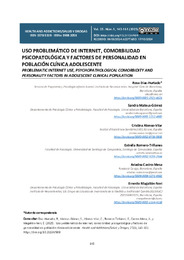Por favor, use este identificador para citar o enlazar este ítem:
https://hdl.handle.net/11000/35742Uso problemático de Internet, comorbilidad psicopatológica y factores de personalidad en población clínica adolescente
| Título : Uso problemático de Internet, comorbilidad psicopatológica y factores de personalidad en población clínica adolescente |
| Autor : Díaz Hurtado, Rosa M Mateus-Gómez, Sandra Alonso, Cristina Romero, Estrella Castro Mesa, Ariadna Magallón-Neri, Ernesto Mijail |
| Editor : Universidad Miguel Hernández |
| Departamento: Departamentos de la UMH::Psicología de la Salud |
| Fecha de publicación: 2025 |
| Enlace al recurso: https://www.haaj.org/?journal=haaj&page=issue&op=view&path[]=56 |
| URI : https://hdl.handle.net/11000/35742 |
| Resumen : Introducción. El Uso Problemático de Internet (UPI) es frecuente en adolescentes en tratamiento psicopatológico. Este estudio analiza la prevalencia de UPI y su asociación con características sociodemográficas, psicopatológicas y de personalidad en una muestra clínica de adolescentes. Adicionalmente, se evalúa la utilidad del Internet Addiction Test - versión jóvenes (IAT-J) y de su versión para padres (IAT-P) para detectar el diagnóstico clínico de “Adicción a Internet”. Método. Participaron 92 adolescentes (12-17 años) de centros de salud mental infantil y juvenil de dos ciudades españolas, junto con uno de sus padres. Los adolescentes informaron sobre su uso de Internet, rasgos y trastornos de personalidad, problemas de conducta (internalizantes y externalizantes) y otras características sociodemográficas y clínicas. Los padres informaron sobre el uso de Internet de sus hijos y los problemas de conducta. Resultados. El 17.4% de los pacientes recibieron el diagnóstico clínico de “Adicción a Internet” según adaptación de los criterios DSM-5 para “Trastorno por uso de videojuegos en Internet”. El 8.7% de jóvenes (según el IAT-J) y el 41.3% de padres (según el IAT-P) reconocieron UPI grave (puntuación ≥ 70). La puntuación del IAT-J se asoció positivamente con problemas de conducta internalizantes y externalizantes, y con peor funcionamiento familiar. También correlacionó negativamente con rasgos de Amabilidad y Responsabilidad, y positivamente con rasgos de Neuroticismo, así como con síntomas de Trastornos de Personalidad Esquizotípica, Histriónica, Límite y Evitativa. Por último, el IAT-P resultó más preciso que el IAT-J para detectar el diagnóstico de “Adicción a Internet”. Conclusiones. Estos hallazgos subrayan la necesidad de evaluar a los pacientes con UPI en variables de personalidad, psicopatología y familiares, con el fin de adaptar los tratamientos en función del resto de problemas asociados. Además, se aporta evidencia sobre la utilidad del IAT, en especial en su versión para padres (IAT-P) para detectar precozmente “Trastorno de Adicción a Internet” en adolescentes con trastornos mentales. Introduction. Problematic Internet Use (PIU) is common in adolescents undergoing psychopathological treatment. This study analyzes the prevalence of PIU and its associations with sociodemographic, psychopathological, and personality characteristics in a clinical sample of adolescents. Additionally, it assesses the usefulness of the Internet Addiction Test - Youth version (IAT-Y) and its parent version (IAT-P) in detecting the clinical diagnosis of "Internet Addiction". Method. Ninety-two adolescents (12-17 years old) from child and youth mental health centers in two Spanish cities, and one of their parents, participated in the study. Adolescents reported their Internet use, personality traits and disorders, behavioral problems (internalizing and externalizing), and other sociodemographic and clinical characteristics. Parents reported their children's Internet use and behavioral problems. Results. The analysis revealed that 17.4% of patients received the clinical diagnosis of "Internet Addiction" based on the adaptedDSM-5 criteria for "Internet Gaming Disorder". A total of 8.7% of young people (according to the IAT-Y) and 41.3% of parents (according to the IAT-P) recognized severe PIU (score ≥ 70). The IAT-Y score was positively associated with internalizing and externalizing behavior problems and with worse family functioning. It also correlated negatively with Agreeableness and Conscientiousness traits and positively with Neuroticism traits, as well as symptoms of Schizotypal, Histrionic, Borderline, and Avoidant Personality Disorders. Finally, the IAT-P was more accurate than the IAT-Y in detecting the diagnosis of "Internet Addiction". Conclusions. These findings underline the need to evaluate patients with PIU in personality, psychopathology, and family variables to tailor treatments according to the rest of the associated problems. Furthermore, evidence is provided on the usefulness of the IAT, especially the parents’ version (IAT-P) in the early detection of "Internet Addiction Disorder" in adolescents with mental disorders. |
| Palabras clave/Materias: Uso problemático de Internet Comorbilidad Personalidad Problemas emocionales y de conducta Adolescentes Problematic Internet Use Comorbidity Emotional and behavioral problems Adolescents Personality |
| Área de conocimiento : CDU: Filosofía y psicología: Psicología |
| Tipo de documento : info:eu-repo/semantics/article |
| Derechos de acceso: info:eu-repo/semantics/openAccess |
| DOI : https://doi.org/10.21134/989 |
| Publicado en: Health and addictions. Salud y drogas. |
| Aparece en las colecciones: Health and Addictions Journal/Salud y Drogas Vol. 25 Núm. 1 (2025) |
 La licencia se describe como: Atribución-NonComercial-NoDerivada 4.0 Internacional.
La licencia se describe como: Atribución-NonComercial-NoDerivada 4.0 Internacional.
.png)
